

Las Wikis. Wiki in Plain English. The Wisdom of Crowds in Government 2.0: Information Paradigm Evolution toward Wiki-Government. El potlatch digital: wikipedia y el triunfo del procomun y el conocimiento compartido. Policy Reviews of Vocational Education and Training (VET) and Adult Learning.
The economies of OECD countries need specific occupational skills - in professional, managerial and technical jobs, in expanding fields such as health care, as well as in traditional trades like electricians.
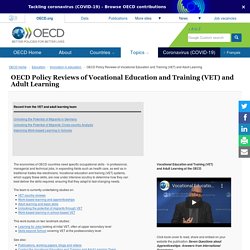
Vocational education and training (VET) systems, which supply these skills, are now under intensive scrutiny to determine how they can best deliver the skills required, ensuring that they adapt to fast-changing needs. The team is currently undertaking studies on: This work builds on two landmark studies: Learning for Jobs looking at inital VET, often at upper secondary levelSkills beyond School covering VET at the postsecondary level. Assessment in Vocational Upper Secondary Education. Pupil/students assessment Internal assessment Internal assessment of students' achievements involves assessing the level of knowledge and skills and the progress made in relation to the requirements based on the curricula.
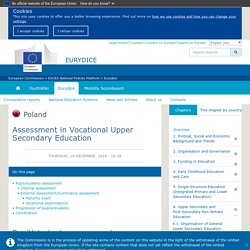
Internal assessment covers learning achievements and behaviour. It is formative assessment. The internal assessment aims at: OECD Reviews of Vocational Education and Training: A Learning for Jobs ... - Kuczera Małgorzata, Brunello Giorgio, Field Simon, Hoffman Nancy. The Architecture of Innovative Apprenticeship. Introduction Benefiting from the support and involvement of two major international research networks, this collection features the latest research findings in TVET.
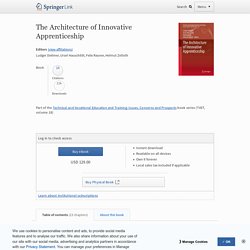
Members of INAP, the International Network on Innovative Apprenticeship, and VETNET, the Vocational Education and Training Network, have contributed key research findings to this detailed survey of the field. Featuring the inclusion of the internationally recognized memorandum released in April 2012 by the INAP Architecture Apprenticeship Commission, the volume covers a wealth of issues relating to technical and vocational education and training, including exemplar architectures such as successful school-to-work transitions, competence assessment and development models, and governance, including the role of stakeholders.
The book provides many opportunities to explore in depth the scholarly debate on TVET, as well as to learn from positive international experiences. Keywords. Dual education in Costa Rica - CentralAmericaData. Dual Vocational Education and Training: international trends, analyses, links and publications. Assessments in the Vocational Education and Training (VET) Environment - Scope Training. Background If studying a program in the Vocational Education and Training sector you may find that things are a little different to school, university or other assessments you may have encountered in your adult life.
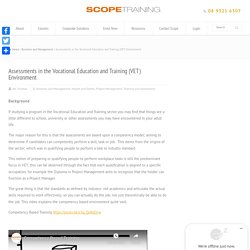
The major reason for this is that the assessments are based upon a competency model; aiming to determine if candidates can competently perform a skill, task or job. Career Development Inventory - IResearchNet. The Career Development Inventory (CDI) is a 120-item standardized measure of career development attitudes and knowledge first published in 1979.
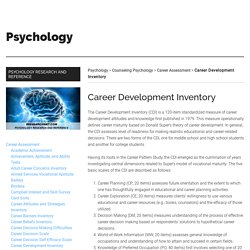
This measure operationally defines career maturity based on Donald Super’s theory of career development. In general, the CDI assesses level of readiness for making realistic educational and career-related decisions. SCAN Skills. Glossary of Terms Basic Skills Reading: Locates, understands, and interprets written information in prose and documents--including manuals, graphs, and schedules--to perform tasks; learns from text by determining the main idea or essential message; identifies relevant details, facts, and specifications; infers or locates the meaning of unknown or technical vocabulary; and judges the accuracy, appropriateness, style, and plausibility of reports, proposals, or theories of other writers.
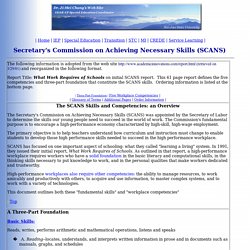
Writing: La actualización de las competencias profesionales: sanidad y formación ... - Fernando Ayuso Baptista. Lo que el trabajo require de las escuelas: informe de la Comision SCANS para ... - United States. Department of Labor. Secretary's Commission on Achieving Necessary Skills. La evaluación por competencias: propuesta de un sistema de medida para el grado en Información y Documentación. Análisis Ocupacional y Funcional del Trabajo. ¿Qué es el aprendizaje basado en competencias? Juandon El aprendizaje basado en competencias es un enfoque de la educación que se centra en la demostración de los resultados de aprendizaje deseados como el centro del proceso de aprendizaje del estudiante. Se refiere principalmente a la progresión del estudiante a través de planes de estudio a su propio ritmo, profundidad, etc.
Como han demostrado las competencias, los estudiantes continúan progresando. Como la mayoría de las cosas relacionadas con la educación, existe un desacuerdo de lo que el aprendizaje basado en la competencia significa en realidad, cuáles son sus rasgos definitorios , y la forma en que idealmente se debe utilizar o cuál es sufunción. Se cree tradicionalmente en términos de habilidades y vocación, pero puede ser completamente “académica” también.
Una característica clave del aprendizaje basado en competencias es su enfoque en el dominio. Sus puntos fuertes son su flexibilidad, ya que los estudiantes son capaces de moverse a su propio ritmo. Career Development Inventory - IResearchNet. About - Assessment & Teaching of 21st Century Skills. About the Project In 2009 ATC21S assembled 250 researchers from around the world and established five working groups: Defining 21st Century SkillsMethodological IssuesTechnological IssuesClassrooms and Formative EvaluationPolicy Frameworks and New Assessments Program at a Glance Mission of the Project Cisco Systems Inc., Intel Corporation and Microsoft Corp. unveiled plans in January 2008 to sponsor a research collaboration to accelerate global education reform by mobilizing the international educational, political and business communities to help transform the teaching, learning and measurement of 21st century skills.
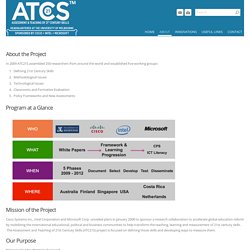
The Assessment and Teaching of 21st Century Skills (ATC21S) project is focused on defining those skills and developing ways to measure them. Our Purpose Empowering Students to SucceedThe Challenge: Transform Education for the 21st CenturyToday’s curricula do not fully prepare students to live and work in an information-age society. Assessment and Teaching of 21st Century Skills: Research and Applications.